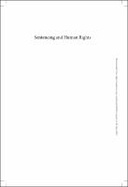Explore

Sentencing and Human Rights: The Limits on Punishment
Sarah Summers
2022
0 Ungluers have
Faved this Work
Login to Fave
Sentencing and Human Rights sets out to develop a systematic account of the importance of human rights principles at sentencing. Sentencing theory is dominated by discussion of the aims of punishment, but it is questionable whether the limits identified in the leading theories—principally the idea of proportionality or commensurability between the wrongdoing and the sentence—have served to constrain the sentencing decision in practice. It is argued that one reason for this is that insufficient attention has been paid to the special nature of state punishment as a process mediated by and through law. Punishment in the rule of law demands adherence to human rights principles, notably legality, proportionality, equality, and judicial responsibility for the determination of the sentence. Consideration of these principles provides the basis for an examination of the way in which they might be expected to limit important sentencing practices, such as the imposition of aggravated sentences for previous convictions, the treatment of confessions, and mandatory minimum sentences. This examination of the human rights limits on the sentence suggests that it might be necessary to reconsider the way in which state punishment is conceptualized in sentencing theory.
This book is included in DOAB.
Why read this book? Have your say.
You must be logged in to comment.
Rights Information
Are you the author or publisher of this work? If so, you can claim it as yours by registering as an Unglue.it rights holder.Downloads
This work has been downloaded 64 times via unglue.it ebook links.
- 64 - pdf (CC BY-NC-ND) at Unglue.it.
Keywords
- criminal law
- Human rights
- Punishment
- Sentencing
- thema EDItEUR::L Law
Links
DOI: 10.1093/oso/9780192870384.001.0001Editions

